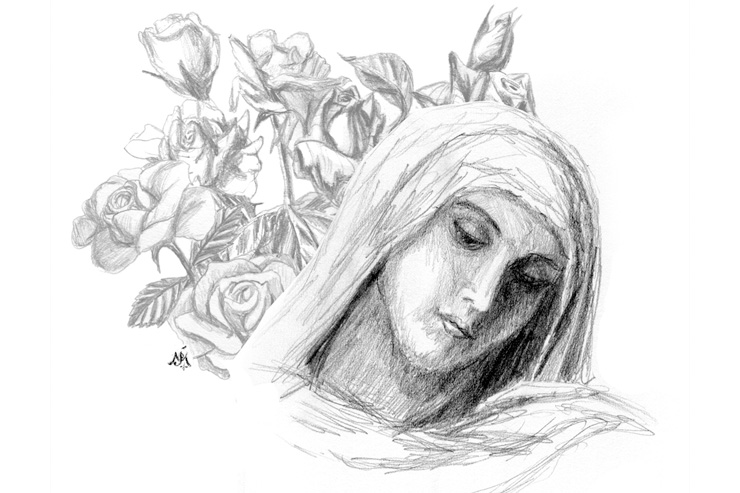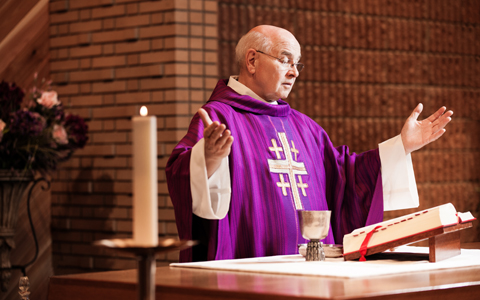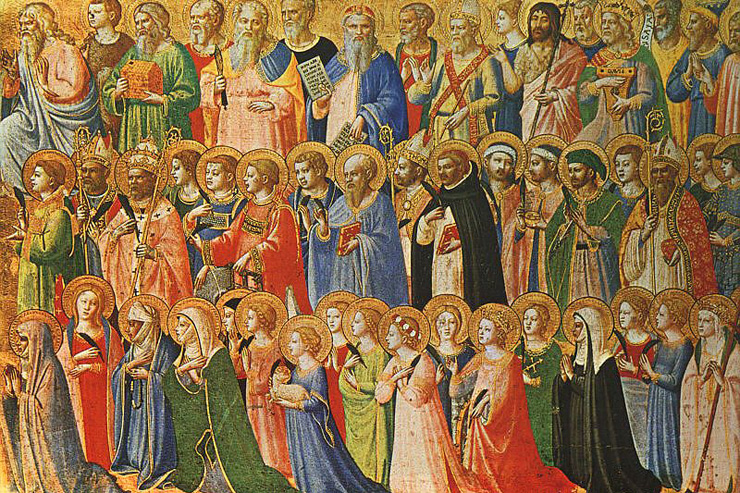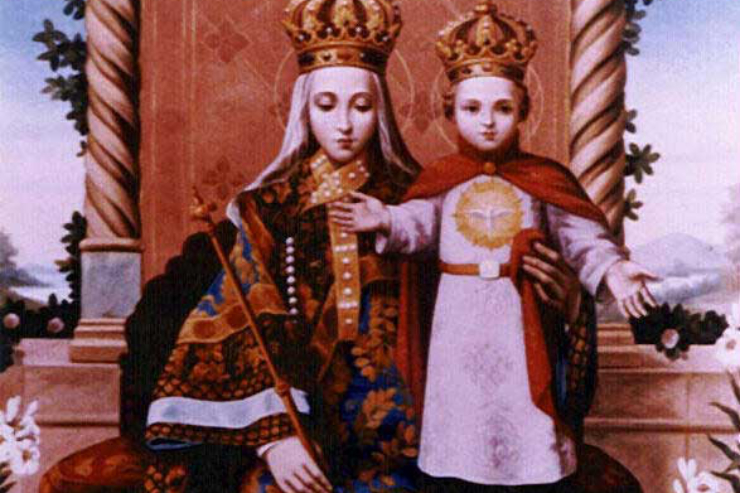
Blessed Virgin Mary with Roses (detail)
Artwork © by Jef Murray
When she was four, my daughter had many career aspirations, and she often shared them with us in a long list. She would announce, out of the blue, that she was going to be a cowgirl, an artist, a flower picker, and a cheerleader when she grew up, and, for my part, I encouraged this diversity in interests.
One day, though, she asked me what I would be when I grow up. “Well,” I said. “Why don’t you tell me what you’re going to be again?” It was a different list that day: artist, veterinarian, doctor, gardener, singer, and butterfly catcher. When she was done, she waited.
“OK,” I said, “I guess I’ll be a mommy.”
She wasn’t so easily fooled. “What else?”
“Um, how about a wife, a writer, a secretary, a teacher, and a horseback rider?” (That last was thrown in because, yes, I would like to be a horseback rider someday…though it might be a while.)
I scored some points, because in her current lists at the time, writer was in the top five. When I asked her, though, a few hours later if she wanted to be a mommy, her quickness in saying “No!” made me wonder if I’m a bad example.
And then I realized that there’s just no glamour in the job, at least not from what she could see of me.
I don’t wear sparkly shoes, shiny clothes, or act hip. I’m often sporting mysterious stains on my outfits, and I’m usually the enforcer of “no dessert until you’ve eaten your meal.” Though I chauffeur her to fun places and narrate “pretend stories,” I’m not in-tune when I belt out my favorite songs, and it’s just as likely that I’ll yell as cry when I’m stressed.
Being a mom was never on my list of things to pursue either. I never expected to get married, and I was certainly never going to have children. I look at myself now with wonder and shock…I have two small children and—get this—I’m enjoying it!
Mary was never going to be a mother either. She was born to aged parents who never quite gave up the hope of children, and, reminiscent of Hannah with her son Samuel, they committed her to the Lord and took her to the Temple. There she was to live, undefiled. The priests knew there was something special about her, but when she reached puberty, they were worried. Menstruating women were unclean by Jewish laws, and they couldn’t let her be in the Temple once she was of age.
Thus began the search for just the right husband: a man who would honor Mary’s virginity and yet marry her and keep her safe. Joseph was chosen from the line-up of available bachelors because of the sign God sent: his staff bloomed with a lily, the symbol for purity.
Joseph might not have been exactly thrilled with the prospect of a young virgin wife. By some accounts, he was an old widower, with grown children, and he didn’t need to basically raise another child. Maybe he objected, but the priests insisted, being sure to warn him that if he defiled Mary — if he made the wedding vows “real”—he would have to answer to God.
Imagine Joseph’s surprise when his young wife—the wife he wasn’t allowed to touch—was found to be pregnant. Everyone knew what caused pregnancy, and Joseph was the husband. He faced the priests, and Mary faced Joseph, and after what must have been many hours of tears (and at least one appearance by an angel to Joseph), he accepted the new role.
It’s quite a story, but I find it all too easy to gloss over it, to make ordinary. I have to step back for a moment and think about what a shock this must have been to Mary. I have to think back to the days when few things were as far from my ambitions as motherhood.
Mary was a virgin, and she was to remain a virgin. I can imagine how Joseph must have gazed at her, much the way my husband gazes at my daughters. Maybe she said things that struck his funny bone, just as the kids in my life do. How did her faith show itself in the way she cleaned house, did laundry, made dinner? Was Joseph astonished by her on a daily basis?
And, beyond the usual dismay and surprise of her unexpected pregnancy, was there a burst of recognition? We read, in Scripture and in the writings of the early Church Fathers, that Jesus is the New Adam, which leads to Mary as the New Eve. Did those who knew Mary best—Joseph, her friends, the priests from the Temple—realize this, that she would bear their salvation?
Mary, under the title of New Eve, speaks to the role of women in God’s plan. She shows us the cross we must bear—whether it’s the juggling act that modern multi-tasking women face or the invisible struggles of daily life. Mary didn’t face many of the challenges we face today; she didn’t have to schedule her online time around her morning prayer time while making sure her preschooler had the right occupations to allow it all to happen.
Even so, Mary’s “yes” to Gabriel’s offer, an offer that would mean a lot of inconvenience, a barrel of heartache, and more joy than the world could imagine, was the answer to Eve’s “yes” to the snake in the Garden of Eden.
When Mary said “yes,” all of heaven must have rejoiced. We often think of it as one word, as a simple reply. Think of it, instead, as God’s giving woman a hand in the salvation that was to come.
Jesus didn’t need a mother, but he chose to have one. God didn’t need humanity, yet he chose to create us. Mary didn’t need an unexpected pregnancy to foil her plans for the future, yet even so, she agreed to it.
Women have a role in God’s plan, and they always have. We joke about Eve causing the Fall by giving the apple to Adam, but God created woman in the beginning for a reason.
Mary reminds us, as women, that God has a purpose for us, and it’s a beautiful, holy purpose. We are designed to say “yes” to God, and though it may be difficult, Mary gives us a model.
I find myself constantly resisting what God wants for my life, sometimes unconsciously. It’s so natural to want to be in control, to try to seek the life I see “out there” in the big world.
But when I do that, when I look past the life I have right in front of me, I fail to say “yes” as Mary did. When I set my goals without asking God what he intends for me, I say “no” to the grace that’s all around me in the vocation I’m resenting, not embracing.
When I see Mary as the New Eve, I have a perfect look at what it means to live my vocation as wife and mother. But I can’t ignore that, in the background, there’s an ideal in Joseph too, a man who said “yes” and who shows me how to welcome sacrifice.
Why don’t I say “yes” to sacrifice as they did? Is the apple of the life I want beckoning me to ignore God? How would I handle the life of Mary and Joseph?
In the answers to those questions, I find a painful truth: I wouldn’t do so well. I don’t do so well with the comfy life I have now; send me back in time and insert an angel, and I’m more likely to pull an Eve than a Mary. My little four-year-old prophet with her montage of ambitions reflected the modern attitude toward vocations: forsake the plain in favor of the glitzy, seek the allure instead of the grace, settle for the excitement instead of the joy.
Mary’s role, bringing Light to the world, wasn’t on my short list of dreams. She did it through her vocation as wife and mother, and by doing it, she gives me, in my current state of life, a role model of the highest order.
















